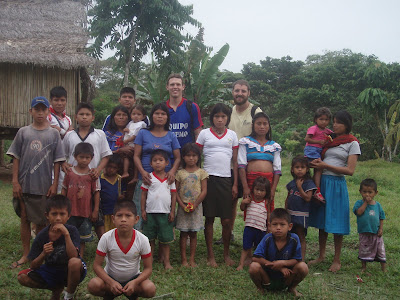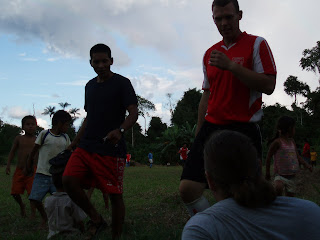Since Jeff is still in the jungle without computer access, he's asked us (his parents) to update his blog from the letters we receive. He writes:
March 13, 2007
We have just started the third week of training and yes, I can receive letters and packages, so please send them. It actually seems strange to think in English again. All of our communication is in Spanish (5 push-ups for every English word). Once again, there is so much to tell, I don't even know were to start.
We are living in the jungle 12 kilometers from Puerto Maldonado in tents. Hopefully that should change in a few weeks. We are in the process of building our houses. The first is a big community house we've been working on for a week or so, but we've still got a lot of work to do on it before we can start the houses we will live in. I am really looking forward to getting those built, because it rains often, and there are few dry spots. By few, I mean one, and that is my backpack covered by my pancho. The work is hard; we can't go to the lumber yard and buy materials. First, we go into the "monte", which is basically the word for wilderness, and find trees to use for the frame. We chop those down using axes and machetes and carry them back through the mud to the construction site. Some of these are 6 & 7 inches in diameter, no easy task. Then, we dig holes for them with our machetes (36 holes so far) and attach the poles or logs together with nails and with rope made from the bark of one of the trees here. Then, we search for the right type of leaves for the roof, chop down these trees and carry the leaves back, which weigh a lot. I was given 8 to carry back and couldn't do it. I have no idea what the process looks like for making these into a roof, because we haven't done it yet. There are several steps after this I have yet to learn and I forgot to mention clearing the ground before hand by machete (no lawn mowers here). We put in the floor to the house today. We cut down 6 or 7 of the trees we used for the frame, the big ones 6-7 inches in diameter, and, I'm not sure how to describe this process, but split them down the middle with an axe, not all the way through, just enough to crack it. We did this over and over until it was basically in strips all connected and then spread it out flat. After striping out the pulp, we carried them back and laid them on the frame we made yesterday.
We cook all of our meals over an open fire, which means we have to start it for every meal and are constantly looking for firewood. I have learned to start a fire with wet wood. We get 50 soles (3.19 soles = 1 dollar) for each group of four for more or less a week. There is not really a schedule for this but once a week or so, two from each group go to the market in Puerto to buy groceries. 50 soles is cheap even here, so we stick mostly to the basics: rice, beans, potatoes, eggs, powdered milk, onion, tomatoes, salt and sugar. We could buy other things, but with the money we have and no refrigerator, that is usually about it. We’ve not eaten monkey yet, but we did kill and eat a snake a few nights ago. It didn’t have much meat, but it was all the meat we’ve had since we got here. We all agreed it was pretty good.
We have started going out to communities. My partner (we go in pairs) Alex, is 15. He's the son of a missionary who has been in Peru for 2 years, and they are both going through training together. The name of our community is Jorge Chavez. There are 36 families who work in their fields near a creek that runs through the area. They grow rice and castanas, which is a brazil nut. It is a mestizo community, which means the people are a mixture of different places and have little native influence in their culture.
We have only gone once and will go back for 2 or 3 day every weekend and once or twice for a week. We started at 9:00am Friday, walked into town because all the cars used for public transportation were full. We then took a boat across the Tambopata River and walked to the community. By the time we arrived, it was 5:30pm because we just missed the boat to cross the river and had to wait three and a half hours for the next one. When we finally arrived, we asked for the president because we are always supposed to ask permission before we stay in a community. They told us he lived back down the road we had just traveled about a kilometer or so. When we got to his house, he wasn't there, so we waited another 2 hours or so. By this time it was dark, and we were not going to find another family to stay with. He agreed to let us stay with him and his family. We talked with him for a few hours, and the next day went with him to the community meeting. We explained that we are training to be missionaries and would like their help, as we had been instructed to say. We had to assure them that were not here to preach to them; only as students to learn and work alongside them. They agreed and a woman named Rosa Barrientos volunteered to allow us to stay with her family. We stayed around for a part of the rest of the meeting and returned. Altogether, I figure we walked about 27 kilometers. I hope the next trip will be as successful as the first; I am really looking forward to going back.
The bugs are not too bad here. There are a lot of flies in the area near the road where we cook, and tiny gnats that bite, but not many mosquitoes. Farther back where our house will be, there are few flies, but lost of mosquitoes. It’s kind of like our backyard at dusk. They say that the girl’s camp is a lot worse as far as the bugs are concerned. We didn’t have a whole lot of sympathy for them because they also say they have so many fruit trees that it is like they’re living in the Garden of Eden. They also have houses already built. We have some banana trees without ripe bananas and a fruit they call pijuayo. It is small and red and not sweet at all, but its not bad when boiled.
A week has passed and we went back to Jorge Chavez and stayed with Rosa Barrientos’ family. We told the president we would be there early, so we woke up at 4:30 and ended up walking again. They live on a farm not much different from what you would find in the States, but much more rustic. They have pigs, cows, chickens, and ducks, grow yucca and rice in their fields. They also cultivate castanas, but I’m not sure how this is done. We worked in the field pulling weeds by hand both days alongside their hired workers, Daniel and Raul, who live with them on the farm. Senor Barrientos, who we have yet to meet, was in Cusco, and his sons, Alein and another whose name I don’t know, worked in another field. They have a TV and a light that ran on a battery charged by a solar panel, which is very expensive. They also have a daughter who has a son.
I told the story of the creation to Daniel, who was not much interested. These stories are how we teach people about God, but it is hard to compete with the TV and radio in this house. While we were there, they killed a pig to sell in the market. When we left, Rosa gave us a sack of yucca and some lemons. We were very impressed by how kind and generous they are.
I appreciate all your prayers and ask you would pray for the following:
-For our health – I couldn’t even count the number of times I’ve been hurt and it healed rapidly. By hurt, I mean cuts and blisters; nothing serious yet.
-Life can be hard here and it is easy to get depressed. We all get tired of being wet, constantly walking through the mud, the bugs, and just working hard everyday, eating the same things.
-That the communities we visit will be blessed because of us. Pray that our stories and manner of living would touch their hearts.
-Continue to pray for our relationships within the team. We have had our share of cultural and personal clashes, but so far we’ve been able to work them all out.
-Patience and dedication to learn.
The names of those in training: Edgar, Levi, Alex, Vincente, Martin, Alex, Corey, Marshall Caleb, Jesus. Lucio, Arminda, Marili and Maria.







 The Quichua people are descendants of the Incas who now live in Ecuador, but this group left the mountains and moved into the jungle on the Tigre River in Peru many years ago. They now speak their own dialect of Quichua, which we will hopefully be able to speak well enough to converse and tell stories within six months. Few speak Spanish, and the Quichua Bible they have is written in a different dialect making it difficult to understand. There are a few Spanish-speaking churches downriver, but little is being done in their language.
The Quichua people are descendants of the Incas who now live in Ecuador, but this group left the mountains and moved into the jungle on the Tigre River in Peru many years ago. They now speak their own dialect of Quichua, which we will hopefully be able to speak well enough to converse and tell stories within six months. Few speak Spanish, and the Quichua Bible they have is written in a different dialect making it difficult to understand. There are a few Spanish-speaking churches downriver, but little is being done in their language.


















